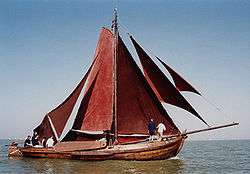Definify.com
Definition 2026
Botter
Botter
See also: botter
German Low German
Noun
Botter
- butter
- 1991, Ulrich Tolksdorf, Ermländische Protokolle: Alltagserzählungen in Mundart, Gloms on Dwarg wurd ook jemoakt, page 212:
- on denn sull doa Botter ware
- 1991, Ulrich Tolksdorf, Ermländische Protokolle: Alltagserzählungen in Mundart, Gloms on Dwarg wurd ook jemoakt, page 212:
Luxembourgish
Etymology
From Old High German butira, from Proto-Germanic *buterǭ. Cognate with German Butter, Dutch boter, English butter, West Frisian bûter.
Pronunciation
- IPA(key): /ˈbotɐ/
Noun
Botter m (uncountable)
botter
botter
See also: Botter
English
Noun
botter (plural botters)
- (Internet) One who operates a bot (automated process).
- 2008, New Scientist (volume 200, issues 2682-2688, page 28)
- It is estimated by industry and leading botters that only around 1 in 10 players using bots make a profit, mainly in low-stakes games.
- 2008, New Scientist (volume 200, issues 2682-2688, page 28)
Afrikaans
Etymology 1
Alternative forms
Noun
botter (plural botters, diminutive bottertjie)
- (uncountable) butter; a soft, fatty foodstuff made from the cream of milk
- butter type
- Ons het 'n klomp gegeurde botters beskikbaar.
- We have a lot of flavoured butter [types]/butters available.
- Ons het 'n klomp gegeurde botters beskikbaar.
- (chemistry, dated) butter; any specific soft substance
Derived terms
- bebotter
- kookbotter
- plaasbotter
Verb
botter (present botter, present participle botterende, past participle gebotter)
Etymology 2

Botter (Dutch fishing vessel).
Noun
botter (plural botters, diminutive bottertjie)
- a type of Dutch fishing vessel with a characteristic hull
French
Etymology
Pronunciation
- IPA(key): /bɔ.te/
Verb
botter
To kick
Conjugation
Conjugation of botter (see also Appendix:French verbs)
| simple | compound | ||||||
|---|---|---|---|---|---|---|---|
| infinitive | botter | avoir botté | |||||
| gerund | en bottant | en ayant botté | |||||
| present participle | bottant /bɔ.tɑ̃/ |
||||||
| past participle | botté /bɔ.te/ |
||||||
| person | singular | plural | |||||
| first | second | third | first | second | third | ||
| indicative | je (j’) | tu | il | nous | vous | ils | |
| simple tenses |
present | botte /bɔt/ |
bottes /bɔt/ |
botte /bɔt/ |
bottons /bɔ.tɔ̃/ |
bottez /bɔ.te/ |
bottent /bɔt/ |
| imperfect | bottais /bɔ.tɛ/ |
bottais /bɔ.tɛ/ |
bottait /bɔ.tɛ/ |
bottions /bɔ.tjɔ̃/ |
bottiez /bɔ.tje/ |
bottaient /bɔ.tɛ/ |
|
| past historic1 | bottai /bɔ.te/ |
bottas /bɔ.ta/ |
botta /bɔ.ta/ |
bottâmes /bɔ.tam/ |
bottâtes /bɔ.tat/ |
bottèrent /bɔ.tɛʁ/ |
|
| future | botterai /bɔ.tʁe/ |
botteras /bɔ.tʁa/ |
bottera /bɔ.tʁa/ |
botterons /bɔ.tʁɔ̃/ |
botterez /bɔ.tʁe/ |
botteront /bɔ.tʁɔ̃/ |
|
| conditional | botterais /bɔ.tʁɛ/ |
botterais /bɔ.tʁɛ/ |
botterait /bɔ.tʁɛ/ |
botterions /bɔ.tə.ʁjɔ̃/ |
botteriez /bɔ.tə.ʁje/ |
botteraient /bɔ.tʁɛ/ |
|
| compound tenses |
present perfect | Use the present tense of avoir followed by the past participle | |||||
| pluperfect | Use the imperfect tense of avoir followed by the past participle | ||||||
| past anterior1 | Use the past historic tense of avoir followed by the past participle | ||||||
| future perfect | Use the future tense of avoir followed by the past participle | ||||||
| conditional perfect | Use the conditional tense of avoir followed by the past participle | ||||||
| subjunctive | que je (j’) | que tu | qu’il | que nous | que vous | qu’ils | |
| simple tenses |
present | botte /bɔt/ |
bottes /bɔt/ |
botte /bɔt/ |
bottions /bɔ.tjɔ̃/ |
bottiez /bɔ.tje/ |
bottent /bɔt/ |
| imperfect1 |
bottasse /bɔ.tas/ |
bottasses /bɔ.tas/ |
bottât /bɔ.ta/ |
bottassions /bɔ.ta.sjɔ̃/ |
bottassiez /bɔ.ta.sje/ |
bottassent /bɔ.tas/ |
|
| compound tenses |
past | Use the present subjunctive tense of avoir followed by the past participle | |||||
| pluperfect1 | Use the imperfect subjunctive tense of avoir followed by the past participle | ||||||
| imperative | – | tu | – | nous | vous | – | |
| — | botte /bɔt/ |
— | bottons /bɔ.tɔ̃/ |
bottez /bɔ.te/ |
— | ||
| 1literary tenses | |||||||